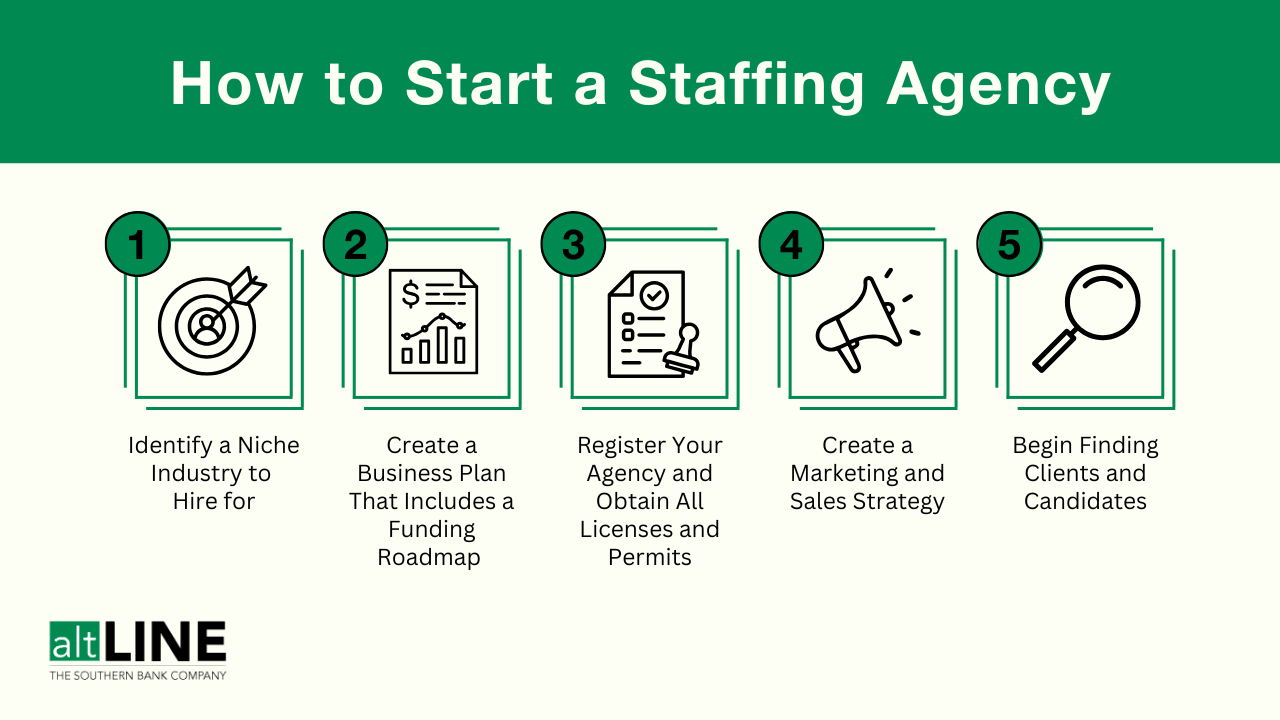Last Updated November 3, 2025
Starting a staffing agency can be an incredibly exciting venture. You can make a lot of money by running a successful staffing agency, and the latest data shows the industry is coming off consecutive years of growth, reaching $650 billion in global revenue.
But many prospective business owners are faced with the same dilemma: how do I start?
This article will walk you through step-by-step how to start an employment agency. But first, a bit more about staffing agencies and why it’s such a good business idea.
Key Takeaways
- Starting a staffing agency is a high-profit business opportunity, with the global staffing industry exceeding $650 billion in annual revenue and continuing to expand.
- To build a successful staffing business, start by choosing a niche market such as IT, healthcare, or finance to position yourself as a specialist and attract qualified clients.
- Make sure you have enough startup capital, obtain the required licenses, permits, and business insurance, and invest in staffing agency software to streamline operations.
- Grow your recruitment agency by creating a professional website, using digital marketing strategies, and building a reliable pool of candidates and clients.
What Do Staffing Agencies Do?
A staffing agency helps companies find their star employees of the future. Usually, a staffing firm builds these relationships through a reliable pool of workers and client companies, along with the help of successful networking.
Agencies identify candidates by a variety of methods, such as utilizing LinkedIn or referrals. Once they have a stable source of competent workers and independent contractors, they can begin distributing them to client companies.
Why Opening a Staffing Agency Is a Good Business Idea
We have generally seen a job market slump ever since the COVID pandemic. For instance, the Bureau of Labor Statistics reported that a record 50.6 million Americans quit their jobs in 2022. While this “Great Resignation” didn’t quite keep up into 2023, it ultimately signaled a shift in the average workers’ mindset. The increased opportunities and desire for remote work might have something to do with that the market remaining in a transition period in 2025.
Right now, there are more than 7 million job openings in the U.S. Tens of thousands of employers are searching for candidates.
These vacancies are where your staffing business comes in. By opening a staffing agency, you can close these employment gaps by providing qualified candidates. Plus, you can start a staffing agency from the comfort of your own home. Once you’re an established business it’s important to attend networking events and meet face-to-face with potential clients and candidates.
But while opening a job agency takes time and effort, you won’t be required to leave your desk for much of the building phase. You can make a lot of money from the comfort of your home or office.
How to Start a Staffing Agency

Now it’s time to look at the step-by-step process of how to start your own job placement agency.
1. Identify Your Niche Industry and Market
It’s possible to start a staffing agency with the broad vision of “supplying any type of worker to any type of company.” However, this outlook has a massive scale and proves difficult to begin from a humble starting point.
Instead, you might find it more advantageous to pick a specific market to specialize in. For example, you could target the IT or medical field, which can be lead to lucrative earnings. Most IT-related positions are very specific (to a particular software or coding process). The more specific it is, the more difficult the position is to fill, but the more money there is to make.
It will be easier for you to find potential staffing clients by selecting a specific field because you will appear like a specialist in that area, an industry expert of sorts. It will also narrow down your staffing agency marketing plan and make your customer approaches more relevant. If you don’t want to specialize in a specific field, then you should at least analyze a target market where you can really hone your craft.
If you live in a city where several companies are searching for managerial position candidates, begin with managerial experience workers. By narrowing your scope, you streamline the market infiltration process and expedite client generation.
2. Ensure You Have Sufficient Working Capital
Starting a placement agency requires a significant amount of money to start because they require a fairly complex financial infrastructure from day one. For instance, you’d have to be very lucky to start with five job candidates and assign them all to the same client. You’re likely going to place them at different companies at different markup rates.
You’ll need a strong base of clients and candidates from the very beginning and that will require sufficient funds. You can expect start-up costs of anywhere between $60,000 to $130,000 depending on the scale of the company you want to create and the market you’re entering.
Some of the expenses you’ll want to be aware of when starting an employment agency are:
- Office space
- Insurance
- Legal fees
- Software
- Office supplies
- Employee wages
- Advertising and marketing
- Additional incentives for clients and job candidates
Once your staffing agency is up and running, you need to make sure you have enough cash flow to sustain growth.
For that, you should consider invoice factoring as an affordable working capital financing solution for your business.
Invoice factoring involves selling your unpaid invoices to a third-party factoring company in exchange for an immediate cash advance. Once you invoice your client, the factoring company immediately advances you 80 to 90% of the sum (usually within 24 hours). Then, whenever your client submits payment to the company, the remaining value of the invoice is released to your staffing agency, minus a small factoring fee.
Staffing agency factoring allows you to enjoy a more steady, reliable cash flow, along with continuous working capital improvements. Instead of your cash flow and working capital movements being reliant on when your customers pay—which can be as long as 30, 45, or even 60 days after you’ve provided your services—you’re guaranteed to see that cash immediately.
3. Create Your Staffing Agency Business Plan
By this point, you should have a good enough of an idea of what your business is going to look like to create your business plan.
A rough outline for how to devise a staffing agency business plan can be:
- Create a Mission Statement and Executive Summary
- Collect Market Research
- Identify Your Competitors
- Project Revenue and Craft a Financial Breakdown
- Explore Staffing Agency Funding Options
- Devise a General Marketing Plan
- Seek Advice from Mentors or Investors
- Continuously Update and Revise Your Plan
This will become the blueprint of your placement agency. It’s pivotal not to overlook the importance of this step by investing ample time and effort into your business plan.
4. Register Your Job Placement Agency
Choosing a business structure is a routine step for any startup, no matter the industry. Most staffing firm owners choose between a sole proprietorship, partnership, corporation, or LLC. Registering your business can be done through the U.S. Small Business Administration website.
If you start a corporation, LLC, or DBA, the company will take on status as a legal entity. This will keep you personally safe if anyone decides to sue the company or it falls into legal trouble. The type of company you choose will also affect your taxes, the business name, and whether or not it can be traded on the stock market.
Regardless of what business structure you choose, you need to follow a specific process, and it varies depending on the state and country where you are doing business. Independent companies and partnerships will also require tax designations and declarations.
Once you decide on the type of company you are, you should choose a business name and get all the licenses and permits necessary. Then you should open a business bank account.
5. Obtain All Necessary Licenses and Permits
The required staffing agency permits, business licenses, and forms differ depending on where your business is located. Most areas let you open an employment agency with a general business license if you only provide general staffing services. However, you may need specialized licenses if you provide temporary staffing for specific fields like medicine and finance.
Regardless of where you live, the following federal documents are required for opening a staffing company:
- EIN (Employer Identification Number)
- IRS Form 941
- Form W-4
- Form I-9
State documents required for starting a staffing company include:
- State Tax ID Number
- Articles of Incorporation
- Business License and Certification
6. Obtain Insurance to Protect Your Employment Agency
If you bought a car, you’d get it insured. If you bought a house, you’d get it insured. If you start a placement agency… There is no difference. Businesses are at risk for legal action and with the amount of capital they require, you probably can’t afford for them to completely fail.
Keep track of the common types of insurance policies required, or recommended, for all staffing agencies. These include:
- General Liability
- Professional Liability
- Commercial Property
- Workers Compensation
- Employment Practices Liability
- Business Owners’ Insurance
- Commercial Auto Insurance
- Cyber Insurance
Many business insurance providers have umbrella policies and packages you can buy so that you won’t have to keep track of individual policies. Packaging all your coverage together will also make it more affordable.
Related: Staffing Agency Insurance Requirements
7. Find the Right Staffing Agency Software
The staffing software you choose will streamline numerous operational processes in order to optimize efficiency. Examples of software include:
- Applicant Tracking Systems (ATS)
- Customer Relationship Management (CRM)
- Vendor Management Systems (VMS)
- Candidate Assessment Solutions
- End-to-End Solutions
You can start by researching top staffing agency software options to find the best choice for your business. You can also do some competitor research to see what applications they use for communication, CRM (customer relations management), and task management.
8. Create a Website and Begin the Marketing Process
In today’s market, most successful staffing agencies have a well-run, easy-to-use, visually appealing website. Companies will use a web hosting platform like WordPress or Squarespace to build their site, but there is a plethora of other options.
Marketing is a pivotal part of any staffing agency because it needs to happen on two fronts. You don’t just need clients, you need workers to sign up for your service, so you have something to provide your clients.
A great staffing marketing plan will encompass outreach plans to both potential clients and workers. It starts with defining your audience, prioritizing web design, establishing a social media presence, and eventually, building your authority in the field. You can do this by searching through common talent pools like LinkedIn, attending local or national networking events, and creating referral programs.
Advertising your employment firm is a whole different ballgame, but trusted ad platforms like Google Ads can simplify things. Staffing agencies often use online ads because they can be advertised to targeted demographics, so that the right people see the ads.
9. Begin Building Your Candidate Pool and Find Clients
After you’ve put in the hard work and you’ve reached this final step, it’s time for the exciting part – finding top candidates and landing your first contract!
The good news is that you should have already laid the groundwork that will help make finding candidates and clients relatively simple. By investing in necessary software, building an optimal website, and knowing how to market your staffing agency, winning clients will be made much easier.
This to say, there are still a few additional tips and steps that can aid in this process. For example, building a client persona can help you visualize the demographic you’re marketing your services to. You can also provide value for free by having a blog section on your website, writing articles on topics that your ideal client might be interested in, or even hosting webinars or workshops.
These actions not only provide value to those interested in your services, but it also boosts your authority and can mold your reputation as an industry expert. If prospective clients and candidates see you as an industry expert, that adds an element of trust to the equation, which is one of the most important factors for consumers choosing between service-providers. A recent Harvard Business Review survey of 1000 consumers showed that more than 80% signaled “trust” as a deciding factor in buying decisions.
In-Summary: Starting an Employment Agency
As long as companies exist, employees will always be in high demand. Staffing firms will continue to bridge this gap and make the life of workers and recruiters much easier. Talent pools like LinkedIn and Indeed are not specific enough and lose quality with advantages in their quantity of workers.
If you want to open a staffing agency, all you need to do is keep track of the steps above. Make sure to make yourself aware of the legal requirements for staffing agencies and get some insurance to keep you and your staff safe.
A good employment agency owner should be able to easily find employees and clients and have an in-depth understanding of what a client needs at a specific position. You should focus on building a reputation as a great matchmaker. This will help you develop lasting relationships with clients and a flourishing business for decades.
Make sure to read our articles on payroll funding for staffing companies and how to finance a staffing company if you need help with financing.
Starting a Staffing Agency FAQs
Below are some common questions about starting a successful staffing agency answered.
How do I start a staffing agency from home?
To start a staffing agency from home, you’ll first need a staffing agency business plan along with an idea for how you’re going to fund your business. You’ll then need to obtain all necessary insurance, comply with state and federal requirements through proper documentation such as a State Tax ID Number, IRS Form 941, Form W-4, and Form I-9, and obtain any other necessary licenses and permits. Then, you can work on building your website, marketing your staffing agency, and eventually, finding candidates and clients.
How profitable is a staffing agency?
A staffing agency can earn up to 10% net profit, meaning it can be fairly profitable. You can increase this profit margin by providing temporary staff for in-demand industries.
How does a staffing agency make money?
A staffing agency makes money by charging its clients for staffing services. Depending on the staffing business, it could either charge a predetermined fee upfront or take a portion of the temporary employee’s wages as payment.
How much money do you need to start a recruitment agency?
The starting business cost for a recruitment agency varies, but you usually need between $3,000 and $250,000, depending on the business size. A smaller initial cost means you may need to do multiple jobs yourself and have limited office space. Conversely, larger initial investments let you hire more people and ensure you are not overwhelmed by everything you have to do.
How do I register as a staffing company in the USA?
You can register as a staffing company in the USA by applying for a general business license with your local government. You may also need a specialized license to provide temporary workers for industries like medicine and finance.
Jim is the General Manager of altLINE by The Southern Bank. altLINE partners with lenders nationwide to provide invoice factoring and accounts receivable financing to their small and medium-sized business customers. altLINE is a direct bank lender and a division of The Southern Bank Company, a community bank originally founded in 1936.










